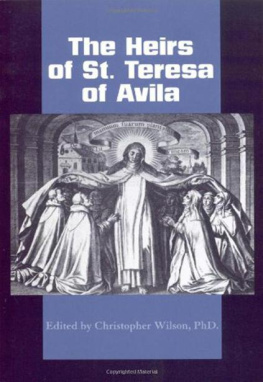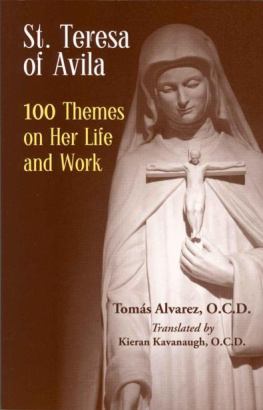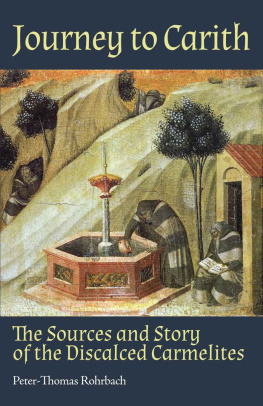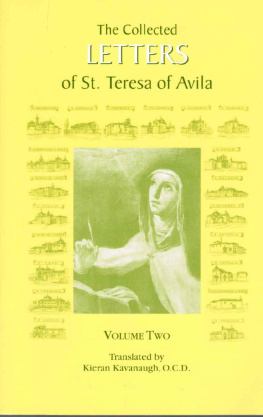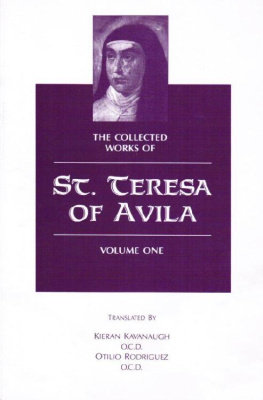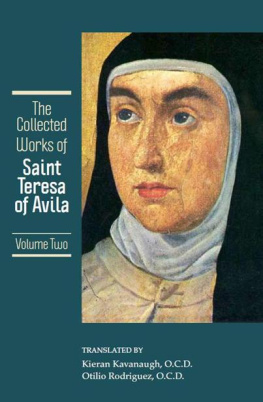CARMELITE STUDIES
IX
CARMELITE STUDIES
THE HEIRS OF
ST. TERESA OF VILA:
DEFENDERS AND DISSEMINATORS
OF THE FOUNDING
MOTHERS LEGACY
Edited by Christopher C. Wilson
ICS Publications Edizioni Carmelitane
Institute of Carmelite Studies Institutum Carmelitanum
Washington, DC Rome, Italy
2006
Washington Province of Discalced Carmelites Inc., 2006
ICS Publications
2131 Lincoln Road, NE
Washington, DC 20002-1199
www.icspublications.org
Library of Congress Cataloging-in-Publication Data
The heirs of St. Teresa of vila : defenders and disseminators of the founding
Mother's legacy / edited by Christopher C. Wilson.
p. cm. -- (Carmelite studies)
Includes bibliographical references.
ISBN 0-935216-40-5 (alk. paper)
1. Discalced Carmelite nuns--Spain--Biography. 2. Discalced Carmelite nuns--
Spain--History. 3. Teresa, of vila, Saint, 1515-1582. I. Wilson,
Christopher Chadwick. II. Series.
BX4308.Z7H45 2006
271 .971046--dc22
2006003576
Contents
Heeding the Madre':
Ana de San Agustn and the Voice of Santa Teresa
Elizabeth Teresa Howe
Blessed Anne of St. Bartholomew
Kieran Kavanaugh, O.C.D.
Taking Teresian Authority to the Front Lines:
Ana de San Bartolom and Ana de Jess
in Art of the Spanish Netherlands
Christopher C. Wilson
Touched by Teresa: Readers and Their Responses, 1588-1750
Jodi Bilinkoff
St. Joseph in the Spirituality of Teresa of vila and
of Francis de Sales: Convergences and Divergences
Joseph F. Chorpenning, O.S.F.S
Introduction
Writing nearly half a century ago, Winifred Nevin began her 1959 book Heirs of St. Teresa of vila with an explanation of its title: Heirs of Teresa of vila are all members of the Discalced Carmelite Order, but in this case the designation refers to those who were St. Teresa's own particular choice: those whom she singled out for special instruction; on whose talents, virtues, and fidelity to the spirit that quickened the Reform she based her hope for its continuance and increase. This issue of Carmelite Studies echoes Nevin's title and theme. The essays collected here present new insights into the lives and writings of those individuals who knew Teresa in life and who, after her death in 1582, worked to propagate and defend her legacy, including four of her most illustrious nuns, Ana de San Bartolom, Ana de Jess, Mara de San Jos, and Ana de San Agustn, and her close male confidante and collaborator, Jernimo Gracin de la Madre de Dios. Each deserving of greater scholarly attention, these figures are here given precedence over St. John of the Cross, another unique and prolific heir, since he has already been the subject of an extensive bibliography. A further focus of the essays is the reception of the Teresian heritage by individuals outside the order, as mediated by these early Discalced Carmelites and by Teresa's published writings.
The essays were originally presented at the 2004 symposium The Heirs of St. Teresa at Georgetown University. That year marked the 400th anniversary of a pivotal moment in Discalced Carmelite history: the arrival in France of a group of six nuns, some of Teresa's most favored protges, including Ana de Jess and Ana de San Bartolom, who had traveled from Spain to inaugurate the order's first French convent. For readers today, far removed from the religious wars that pitted Catholic against Huguenot in sixteenth-century France and the subsequent Catholic renewal born from these eruptions, it may be difficult to recover the gravity of the occasion. The nuns perceived the venture as no less than a culmination of Teresa's project of religious reform since, during her life, France was very much on her mind. In the prologue to The Way of Perfection Teresa explains that she founded her first convent, St. Joseph's in vila, with so much external austerity because news reached me of the harm being done in France and of the havoc those Lutherans [the term by which Teresa refers to Huguenots] had caused and how much this miserable sect was growing.
Also in 1604, the same year that the Spanish nuns arrived in Paris, another significant expansion occurred across the Atlantic when the first Discalced Carmelite convent in the Americas was founded in the Mexican city of Puebla. Since Teresa intended for her nuns' prayers and mortifications to be directed toward the work of conversion of Native Americans as well as Protestants, the growth of her order within the New Word had special resonance. Through prayer, dispensation of spiritual advice, acceptance of novices, and the placement of churches beside their convents, female monastic communities played a key role in cultivating a relatively young American Church. The propagation of Teresa's legacy, therefore, was a global enterprise.
In the past half-century several important publications, some authored by contributors to this volume, have encouraged new interest in Teresa's heirs. These include Julin Urkiza's magisterial critical edition of the works of Ana de San Bartolom; Ildefonso Moriones' study of Ana de Jess; Joseph Chorpenning's anthology of readings from Jernimo Gracin's S ummary of the Excellencies of St. Joseph, with its introductory analysis of Gracin's life and work; and Elizabeth Teresa Howe's edition of two autobiographical relaciones by Ana de San Agustn ( The Visionary Life of Madre Ana de San Agustn ). Of particular significance is the pioneering1989 anthology by Electa Arenal and Stacey Schlau, Untold Sisters: Hispanic Nuns in Their Own Works , which contains selections by Ana de San Bartolom and Mara de San Jos. For many readers in the United States (including myself), this volume provided an initial acquaintance with the writings of Teresa's daughters. A more recent anthology by Barbara Mujica, Women Writers of Early Modern Spain: Sofia's Daughters, attests to continued enthusiasm for these two nuns through its inclusion of some of their written works. Alison Weber has greatly expanded our knowledge of and appreciation for Mara de San Jos with her edition of Book for the Hour of Recreation, with translations by Amanda Powell and an introductory essay investigating Mara's role in the Carmelite reform and her literary contributions.
The present volume begins with Weber concentrating further on Mara de San Jos, here chronicling the steps by which she learned a lesson in discipleship. Soon after Teresa appointed her as prioress of the new Seville convent, Mara had to manage disruption within the community when two nuns began to report mystical experiences of dubious authenticity. She complained that the convent's confessor and chaplain fueled the unhealthy situation. Through letters Teresa counseled Mara to handle the affair with patience, courtesy, and tolerance for the weakness of others but was often frustrated by her young pro-tge's headstrong attitude. Mara's subsequent writings reveal that she eventually absorbed Teresa's example of gentleness in negotiations with others.
Barbara Mujica explores Teresa's complex relationship with another strong-willed personality within the reform, Jernimo Gracin de la Madre de Dios. Scholars have long been puzzled by the saint's deep friendshipsome would even say infatuationwith the young, impetuous friar whom she met in 1575 and to whom she almost immediately made a spontaneous vow of obedience. Mujica analyzes Teresa's correspondence with Gracin and suggests that, though she professed obedience to him, she took on the role of fond mother who sometimes treated her spiritual son with indulgence, and at other times tried to supervise him with directives and reprimands.
In order to show how Teresa's nuns often invoked the foundress in order to shore up their own claims to authority, Elizabeth Teresa Howe examines the autobiographical writings ( relaciones ) of Ana de San Agustn, a nun whom Teresa recruited to accompany her to the new foundation at Villanueva de la Jara and who later was elected prioress of that community. Her writings are replete with accounts of mystical experiences, including her visions of heaven and hell. She also claimed to receive posthumous visits and instructions from Teresa that authorized her own role as mediator between the deceased foundress and those on earth who had not personally known her.

